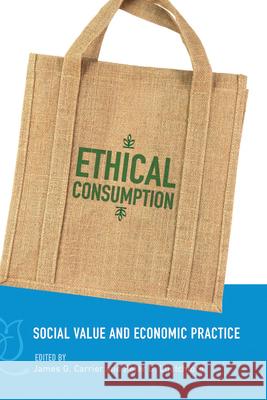Ethical Consumption: Social Value and Economic Practice » książka
Ethical Consumption: Social Value and Economic Practice
ISBN-13: 9781782386766 / Angielski / Miękka / 2014 / 246 str.
Ethical Consumption: Social Value and Economic Practice
ISBN-13: 9781782386766 / Angielski / Miękka / 2014 / 246 str.
(netto: 129,31 VAT: 5%)
Najniższa cena z 30 dni: 134,94
ok. 30 dni roboczych
Dostawa w 2026 r.
Darmowa dostawa!
"This edited volume brilliantly shows that ethical consumption is a process of socializing (and fetishizing) goods on the consumption side, as well as a process of economizing social values on the production side." - Sociologus "All of the case studies presented] here are remarkable in terms of their analysis and ethnographic richness, providing a wonderfully nuanced picture of ethical consumption." - American Ethnologist "This is a great volume that...brings together a very good set of chapters that consider ethical consumption in a broad and therefore most stimulating manner. Rooted in an ethnographic approach and located within an anthropological line of thought, this volume will nevertheless have wide appeal beyond this discipline, and will no doubt be of great interest to cultural and media studies scholars, geographers, development studies and other related disciplines." - Geert de Neve, University of Sussex "This volume is a most timely contribution to a rapidly expanding literature in the social sciences. The editors are to be commended for assembling an interesting, well-written collection of essays." - Mark Moberg, University of South Alabama Increasingly, consumers in North America and Europe see their purchasing as a way to express to the commercial world their concerns about trade justice, the environment and similar issues. This ethical consumption has attracted growing attention in the press and among academics. Extending beyond the growing body of scholarly work on the topic in several ways, this volume focuses primarily on consumers rather than producers and commodity chains. It presents cases from a variety of European countries and is concerned with a wide range of objects and types of ethical consumption, not simply the usual tropical foodstuffs, trade justice and the system of fair trade. Contributors situate ethical consumption within different contexts, from common Western assumptions about economy and society, to the operation of ethical-consumption commerce, to the ways that people's ethical consumption can affect and be affected by their social situation. By locating consumers and their practices in the social and economic contexts in which they exist and that their ethical consumption affects, this volume presents a compelling interrogation of the rhetoric and assumptions of ethical consumption.
"This edited volume brilliantly shows that ethical consumption is a process of socializing (and fetishizing) goods on the consumption side, as well as a process of economizing social values on the production side." · Sociologus"All of the case studies [presented] here are remarkable in terms of their analysis and ethnographic richness, providing a wonderfully nuanced picture of ethical consumption." · American Ethnologist"This is a great volume that...brings together a very good set of chapters that consider ethical consumption in a broad and therefore most stimulating manner. Rooted in an ethnographic approach and located within an anthropological line of thought, this volume will nevertheless have wide appeal beyond this discipline, and will no doubt be of great interest to cultural and media studies scholars, geographers, development studies and other related disciplines." · Geert de Neve, University of Sussex"This volume is a most timely contribution to a rapidly expanding literature in the social sciences. The editors are to be commended for assembling an interesting, well-written collection of essays." · Mark Moberg, University of South AlabamaIncreasingly, consumers in North America and Europe see their purchasing as a way to express to the commercial world their concerns about trade justice, the environment and similar issues. This ethical consumption has attracted growing attention in the press and among academics. Extending beyond the growing body of scholarly work on the topic in several ways, this volume focuses primarily on consumers rather than producers and commodity chains. It presents cases from a variety of European countries and is concerned with a wide range of objects and types of ethical consumption, not simply the usual tropical foodstuffs, trade justice and the system of fair trade. Contributors situate ethical consumption within different contexts, from common Western assumptions about economy and society, to the operation of ethical-consumption commerce, to the ways that peoples ethical consumption can affect and be affected by their social situation. By locating consumers and their practices in the social and economic contexts in which they exist and that their ethical consumption affects, this volume presents a compelling interrogation of the rhetoric and assumptions of ethical consumption.











